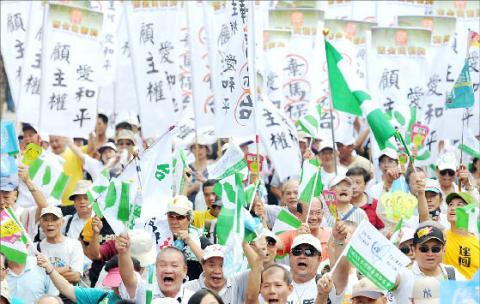Thousands of people attended a rally yesterday afternoon in Taipei to voice their opposition to the so-called “1992 consensus” and express their concern over Taiwan’s sovereignty under President Ma Ying-jeou’s (馬英九) administration.
Thousands of people gathered in front of the Presidential Office to mark the 60th anniversary of the signing of the San Francisco Peace Treaty as part of the rally, which was organized by the Taiwan Nation Alliance.
The aim of the parade was to say to both the Chinese Nationalist Party (KMT) and the international community that Taiwan does not belong to China, organizers said.

Photo: Lo Pei-der, Taipei Times
Japan signed the San Francisco Peace Treaty with 48 UN member countries in a meeting on Sept. 8, 1951. In the treaty, Japan declared that it would relinquish its claims to Taiwan, Penghu and all other offshore islands.
Although the treaty has weight in international law, it does not say to which party Japan ceded Taiwan and Penghu, alliance spokesperson Yao Chia-wen (姚嘉文) said, adding that this means Taiwan is not part of China and that Taiwanese have the right to establish their own country.
The “1992 consensus” never existed, Yao said, adding that by accepting a consensus on the basis of “one China,” Ma had committed treason because he claimed that Taiwan’s sovereignty belongs to another country.
The parade started in front of Wanhua (萬華) Train Station at 2:28pm, in commemoration of the 228 Massacre in 1947, and ended on Ketagalan Boulevard.
Several political parties, including the Democratic Progressive Party (DPP), the Taiwan Solidarity Union (TSU) and the Taiwan Nationalist Party, as well as many pro-independence groups, took part.
During the parade the crowd chanted slogans: “Dump Ma, protect Taiwan,” “Taiwan Consensus: ‘One China, One Taiwan’” and “Protect sovereignty, safeguard peace,” with protestors carrying various handmade signs and placards, some of which read “anti--annexation” and “China: hands off Taiwan.”
The parade was held to remind the international community that the San Francisco Peace Treaty gave Taiwanese the status of “free men” who, like people of other colonies around the world after World War II, were given the right to establish their own country, TSU Chairman Huang Kun-huei (黃昆輝) said.
Taiwan’s sovereignty belongs to no one else — neither to the Republic of China nor the People’s Republic of China. It belongs only to Taiwanese, he said.
It is a fact that Taiwan’s status remains undetermined, because the “Taiwan problem” after World War II was handled differently from that of Korea and Okinawa, said Chen Yi-shen (陳儀深), an associate research fellow in the Institute of Modern History at Academia Sinica.
After Japan ceded its right to Taiwan and Penghu, Taiwanese never exercised their right to self-determination and this was because of the occupation by KMT military forces, Taiwan Association of University Professors president Chang Yen-hsien (張炎憲) said, adding that if the KMT won the presidential election next year, Taiwan’s status risked being be further jeopardized.
“Nobody can deny the fact that Taiwan is a sovereign country,” DPP Secretary-General Su Jia-chyuan (蘇嘉全) told reporters before the parade.

INVESTIGATION: The case is the latest instance of a DPP figure being implicated in an espionage network accused of allegedly leaking information to Chinese intelligence Democratic Progressive Party (DPP) member Ho Jen-chieh (何仁傑) was detained and held incommunicado yesterday on suspicion of spying for China during his tenure as assistant to then-minister of foreign affairs Joseph Wu (吳釗燮). The Taipei District Prosecutors’ Office said Ho was implicated during its investigation into alleged spying activities by former Presidential Office consultant Wu Shang-yu (吳尚雨). Prosecutors said there is reason to believe Ho breached the National Security Act (國家安全法) by leaking classified Ministry of Foreign Affairs information to Chinese intelligence. Following interrogation, prosecutors petitioned the Taipei District Court to detain Ho, citing concerns over potential collusion or tampering of evidence. The

‘FORM OF PROTEST’: The German Institute Taipei said it was ‘shocked’ to see Nazi symbolism used in connection with political aims as it condemned the incident Sung Chien-liang (宋建樑), who led efforts to recall Democratic Progressive Party (DPP) Legislator Lee Kun-cheng (李坤城), was released on bail of NT$80,000 yesterday amid an outcry over a Nazi armband he wore to questioning the night before. Sung arrived at the New Taipei City District Prosecutors’ Office for questioning in a recall petition forgery case on Tuesday night wearing a red armband bearing a swastika, carrying a copy of Adolf Hitler’s Mein Kampf and giving a Nazi salute. Sung left the building at 1:15am without the armband and apparently covering the book with a coat. This is a serious international scandal and Chinese

Seventy percent of middle and elementary schools now conduct English classes entirely in English, the Ministry of Education said, as it encourages schools nationwide to adopt this practice Minister of Education (MOE) Cheng Ying-yao (鄭英耀) is scheduled to present a report on the government’s bilingual education policy to the Legislative Yuan’s Education and Culture Committee today. The report would outline strategies aimed at expanding access to education, reducing regional disparities and improving talent cultivation. Implementation of bilingual education policies has varied across local governments, occasionally drawing public criticism. For example, some schools have required teachers of non-English subjects to pass English proficiency

TRADE: The premier pledged safeguards on ‘Made in Taiwan’ labeling, anti-dumping measures and stricter export controls to strengthen its position in trade talks Products labeled “made in Taiwan” must be genuinely made in Taiwan, Premier Cho Jung-tai (卓榮泰) said yesterday, vowing to enforce strict safeguards against “origin laundering” and initiate anti-dumping investigations to prevent China dumping its products in Taiwan. Cho made the remarks in a discussion session with representatives from industries in Kaohsiung. In response to the US government’s recent announcement of “reciprocal” tariffs on its trading partners, President William Lai (賴清德) and Cho last week began a series of consultations with industry leaders nationwide to gather feedback and address concerns. Taiwanese and US officials held a videoconference on Friday evening to discuss the